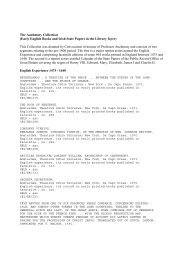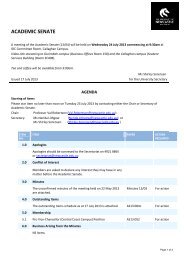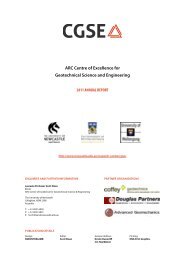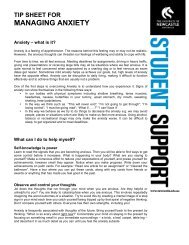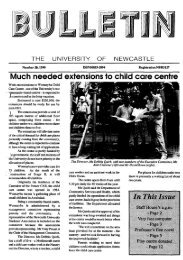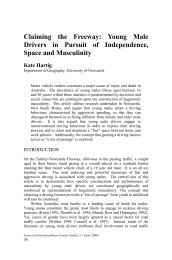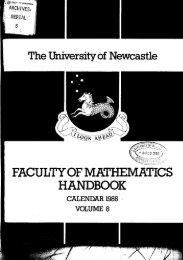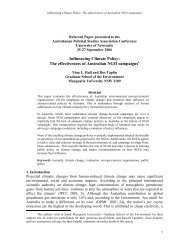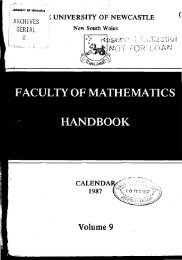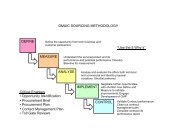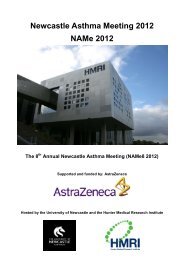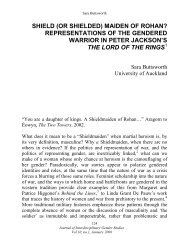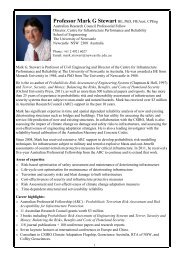n - University of Newcastle
n - University of Newcastle
n - University of Newcastle
Create successful ePaper yourself
Turn your PDF publications into a flip-book with our unique Google optimized e-Paper software.
SUBJ'OXCTTTE 3100~.<br />
T. 10.<br />
Tetti buili-ko, 'to die.'<br />
Tetti ba-un-il-kos noa, 'in order that he might die.'<br />
Tetti b8a-kkn-koa noa, 'lest ht: should die.'<br />
Tetti ka-min uoa ba, '~vlien he dies,' 'if he should die.'<br />
Tetti bai-g t noa, ' he had alulost died.'<br />
Tetti ba-pa noa, 'had he died,' 'if he had died.'<br />
IMPEBATITE<br />
DIOOD.<br />
Tetti brt-unra, ' proceed to die' (optatively).<br />
Tetti bi~tl-billa b611, ' permitPim to die.'<br />
Tetti b6a-lia, ' die again.'<br />
PARTICLES used instead <strong>of</strong> the VERB ' TO BE.'<br />
1. The cerb, zoit7h n substanti~ae attribzcte : t a, 'it is' ; t a r a r 6 n,<br />
' it is not.'<br />
2. The verb, zoifh an ncijectioe attribufe : 16 g, 'it is'; k or a<br />
1 A g, ' it is not.'<br />
3. The cerb, zcif7t a perso~zaZ nttribute: (1) b o, is 'self '; (2)<br />
g a 1 i, ' this ' is the agent who.<br />
E.cantp1es <strong>of</strong> 1, 2, ajzc13 :-<br />
U n 11 i b o bag , 'this is I ' (the subject <strong>of</strong> the verb) ;<br />
gat o a b o u n 11 i, ' this is I myself (the personal<br />
aqeut), who' . . ; uilni ta, 'thisis' (the subjecr;) ;<br />
unni bo ta, 'thisisitself' (thesubject); gali nos<br />
m i y a, ' this is he who spoke.'<br />
Pulli,'salt' (asubsf.); pulli ta,'itis salt' (asubst.);<br />
ulli 16g, 'itissalt' (anarlj.); pulli liora lhg,<br />
qtisnot salt' (an adj.) ; tararkn* pulli korien,<br />
'it is not sdlt7 (a subsf.)<br />
*There are two negatives here, as usual, but the former <strong>of</strong> them my be<br />
omitted.<br />
4. IPhe ve~b, tcit7~ ajz aftiai6ufe rf nzanner: yan t i, 'it is so';<br />
y anti b o t a, ' it is so itself' ; intpe~.otire : y an 6 a, ' let be as<br />
it is'; y a-ai (used negatively), 'lec it not be so.'<br />
Exantpie :-<br />
Paai, bGilki yiliora, 'let it nct be so, strike not.'<br />
5. The verb, exptpl-essing feitdency : w al, 'is,' 'shall,' 'mill'<br />
(denoting tendency <strong>of</strong> the mind or thing) ; inzperntive : w i y a,<br />
' say,' ' declare what you wish.'<br />
Exnntp7es :-<br />
Tiir ma1 unni, 'this is broken'; miya,, unni murrirag,<br />
'say, is this good?'<br />
TEE GIlA1IXIR. 43<br />
6. The cerb, e.r2i-essinaY being or existence: k e, ' be,' ' is.'<br />
Exainple :-<br />
3finarig ke uizni? 'what (thing) is this?'<br />
[XOTE.--I am not sure that all these particles are used as<br />
substitutes for the re& 'to be.'-ED.]<br />
THE VZRB used NEGATIVELY.<br />
ISDICATIVE ~\IooD.<br />
&TI-~izntively. LVgniiuely.<br />
T. 1. ICstbm6, bhn-tau b6n bsg. Iie,zi~rarJu, b6u bag bhn korien.<br />
' Yes, I str~ke him.'<br />
5. B6n-kBkn b6n bag.<br />
'I hare struck him.'<br />
6. Bi~u-kolla b611 bai.<br />
' I had struck him.'<br />
5. B6n-liia b6n bag.<br />
' I shall strike him.'<br />
9. Bhn-nC.1 wal b6n bag.<br />
' I shail strike him.'<br />
' No, I str~ke 111111 not.'<br />
Keawai, b6n bag bh-ki-pa.<br />
'KO, I heve not strnrak h~m.'<br />
Iieac.adn, b611 bag bhm-pa.<br />
'No, I had not &ruck him.'<br />
Iieawai, b611 bng bi~n-kin.<br />
'No, I slinll not strike him.'<br />
Kea>rai, wal b611 bag b61i korien.<br />
'So, I shall not str~ke h~nl.'<br />
T.<br />
PARTICIPLES.<br />
1. Bbn-kill-in b6n bag.<br />
' I am striking him.'<br />
3. Bhn-killi-ela b6a bag.<br />
'I was striking him.'<br />
9. Bhn-lrilli-nkn b6u bag.<br />
'I am going to strike him.'<br />
Iiean-arm, bcju bag bh-liilli liorien.<br />
'No, I am not stliking him.'<br />
ICeamaran,b6n bag b6n-liilli kora kal.<br />
'No, I mas not going to strike him.'<br />
Iienx~ai, b611 bzg biui-Billi liora be.<br />
'No, I am not going to strike him.'<br />
IITPERATITE MOOD.<br />
dla~zrlntoly-<br />
Ehma b6n, 'strilie him.' Ma, biiva b6n, ' do, strike him.'<br />
Panoa, bh-ki yikora bdn, ' let be, strike him not.'<br />
Bhu-kiilti, ' strike on,' ' continue to strike.'<br />
Yanoa, bh-killa-ban kora, ' let be, cease strikine;.'<br />
- B6m-mara-buu-billa b6u, 'permit him to be struck.'<br />
Pari, b6n bi b6m-mara-bun-bi yikora, ' hold ! let him not<br />
be struck.'<br />
En freaty-<br />
B6m-min-billa-h&. ' permit him to strike.'<br />
Ianoa, bhm-nun-bi yikorn b6n, 'let be, permit him not to<br />
strike.'<br />
Int~rroga<br />
fiae-<br />
llinarig-tin binug b6n-kulla? ' mhy did'st thou strike him?'<br />
Kora kua Ginug b6m-pa? ' why hast thou not struck him ?'



